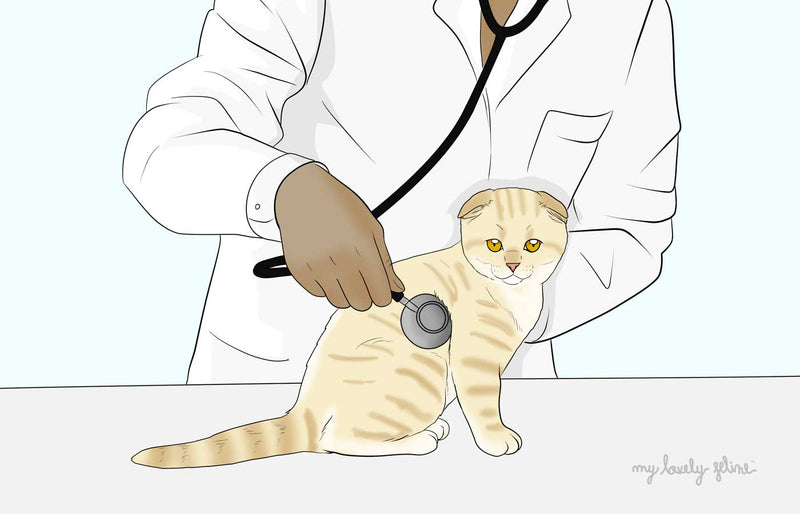—Veterinarian 🇺🇸
|
As a society, our viewpoint on how pets (cats specifically) fit into our lives has drastically changed over the past few decades. Nowadays, it is very common for domestic cats to be considered members of the family. A few decades ago, it would be unheard of to take your cat to the vet more than once or twice in their lifetime. With this shift in viewpoint, has come an increase in veterinary research and knowledge that suggests cats need to see their veterinarian just as much as dogs do, if not more often. |
Kittens (<1 Year of Age)
In general, kittens are healthier than older cats, however, during this life stage, kittens need to see their vet fairly frequently. These visits focus mostly on preventive medicine.
Kittens first need to see their veterinarian when they are around 6-8 weeks of age for their first vaccines.
At this age, it is important that kittens receive their combination Feline Viral Rhinotracheitis Calicivirus and Panleukopenia (FVRCP) vaccine boosters every 3-4 weeks until they are 16 weeks of age in order to establish immunity against these potentially deadly diseases.
Once kittens are 16 weeks of age, they can receive their Feline Rabies vaccine. Once finished with their FVRCP series and Rabies vaccine, they are not due for any vaccines for a year.
There is, however, some recent evidence to suggest that kittens need to receive a booster of FVRCP at 6 months of age rather than at 1 year of age.
Generally, at a kitten’s first visit, they should also receive a fecal test to screen for presence of intestinal parasites as well as a small blood test to screen for presence of retro-viral infections Feline Immunodeficiency virus (FIV) and Feline Leukemia virus (FeLV). If negative for FeLV, it is also recommended that kittens receive two boosters of the FeLV vaccine 3-4 weeks apart.
Once vaccines are finished, the next step in your kitten's preventative medicine schedule is to think about getting her/him spayed/neutered. Before this procedure, veterinarians typically recommend a small wellness blood work panel to make sure your kitten is healthy enough to undergo anesthesia.
Additionally, during these visits, your veterinarian can talk to you about your kitten’s lifestyle, diet, and risks he/she may have based on her lifestyle.
Adult Cats (1-8 Years of Age)
After the first year of life, cats are considered adults until they are around 8 years of age. In general, adult cats only need to see their veterinarian every 12 months.
At their first vet visit post-kittenhood, adult cats typically should receive a 1-year booster of their Rabies vaccine, as well as a booster of their FVRCP vaccine. This FVRCP vaccine lasts for 3 years. The Rabies vaccines still need to be boosted annually.
If your cat is indoor-only, they do not need to have their FeLV vaccine boosted. If your cat does go outside, your veterinarian will recommend an annual FIV/FeLV test and an annual booster of the FeLV vaccine.
Most veterinarians also recommend annual bloodwork and fecal tests for all adult cats. This is to record a baseline of normal values for your cat. This annual blood work can help your veterinarian monitor subtle changes in values that can help them catch certain diseases early.
Senior Cats (8+ Years of Age)
Once cats reach the senior life stage, they need to see their veterinarian a little more frequently than when they were younger. In general, it is recommended for feline senior patients to see their veterinarian every 6 months. This is because cats age much faster than humans do.
Their vaccine schedule remains the same as when they were adults. Senior cats should continue to receive their FVRCP vaccine booster every 3 years, their Rabies vaccine every 1 year, and if they go outside, they should continue to receive annual FeLV vaccine boosters.
Senior cats should receive wellness bloodwork every 6-12 months to monitor important values such as those that reflect changes in the liver and kidneys.
By checking these bloodwork values every 6-12 months, your veterinarian can catch subtle changes that may suggest early stages of certain diseases. By catching things early, your veterinarian can make recommendations that can help your cat’s prognosis with a particular disease.
Sick Visits
I think everyone can agree that cats are very stoic creatures. Most cats do not like to show us when they are in pain or not feeling well.
Cats also typically show very vague symptoms that could be an indicator of many potential issues.
For instance, a cat that is not eating as much as he/she used to could mean they are just tired of the current flavor of the week, they are displeased with the feng-shui of the living room, but could also be the first sign of a multitude of metabolic issues.
Any time you notice a change in your cat’s normal behaviors or routines, these should be discussed with your veterinarian to make sure there is nothing serious going on.
Keeping up with the annual or semi-annual wellness visits and diagnostic tests can help prevent those surprise sick visits.
Q&A
Q: Why should I spay or neuter my kitten?
A: The easy answer is that spaying and neutering prevent unwanted kittens. Additionally, spaying and neutering prevent undesirable behaviors such as urine spraying. Spaying before a female kitten's first heat cycle significantly reduces their risk of mammary, uterine, and ovarian cancer. Neutering reduces the risk of many prostate issues.
Q: How would my kitten catch worms?
A: A lot of times kittens are born with intestinal parasites. These parasites are passed onto them before they are born, from their mom. If your kitten tests positive for worms, your veterinarian will recommend treating them with an oral deworming medication.
Q: What is my cat’s lifespan?
A: The average lifespan of a cat is anywhere from 12-16 years of age. Some cats can live until they are in their early twenties! Keeping your cat healthy can prolong their lifespan, and certain diseases and conditions can reduce your cat’s lifespan.
Q: How do I decide to let my kitten go outdoors?
A: In general, it is not recommended to start letting your cat go outside. They are more at risk for getting hit by a car, getting attacked by a cat or other animal, catching diseases such as FIV or FeLV, picking up intestinal parasites, getting heartworm disease, getting fleas, or ticks, getting tick-borne diseases such as Lyme disease, etc.
If you have an adult cat that is already used to going outside, sometimes it is very difficult to have them transition to an indoor-only lifestyle and that’s okay.
There are just some additional recommendations your veterinarian may have in order to keep them safe and healthy.
Conclusion
The viewpoint that cats do not need to see their veterinarian has shifted over time. Cats are now considered part of the family in many households and because of this, we have learned that their health is just as important as ours.
In general, cats should see their veterinarian at least once a year for a wellness visit. During certain life stages, your cat may need to see their vet a little more frequently.
Article by Dr. Kimberly Couch 👩⚕️
Veterinarian




